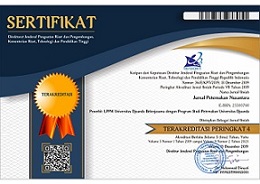Publication Ethics
In order to maintain manuscript quality and avoid plagiarism in publication process, IAJAS has set scientific publication ethics. These apply to authors, editors, reviewers, and editorial staff. The ethics refers to the ones decreed by the Council of Research Professor of Indonesian Institute of Sciences (LIPI) in 2014.
Author Ethics
1) Reporting: Author shall fairly, clearly, and thoroughly provide information on the process and results of the research to the editorial staff and keep the data of the research well and safe.
2) Originality and plagiarism: Author shall ensure that the submitted manuscript is original, written by him/herself, originated from his/her own ideas, and not plagiarized from other people work or ideas.
3) Duplicate submission: Author shall inform the editorial staff that the submitted manuscript has not ever been submitted to any other journals or publications. Should a manuscript be suspected as a redundant publication, IAJAS will strictly reject it.
4) Author Status: Author shall inform the editorial staff that the author(s) has/have competence or qualification in any field of science IAJAS covers. The author submitting the manuscript should be the first author (co-author) so that any problems found in publication process can be solved immediately.
5) Manuscript Writing Mistakes: Author shall inform the editorial staff all manuscript writing mistakes be them the results of review or editing. The mistakes may be about writing of names, affiliation/institutions, citation, and other things that might reduce the meaning and substance of the manuscript. Author should immediately request for manuscript revision.
6) Declaration of Conflict of Interest: Author shall understand all the above-mentioned scientific publication ethics to avoid conflict of interest with other parties so that the manuscript can be smoothly and safely processed.
Editor Ethics
1) Publication Decision: Editor shall ensure the thorough, transparent, objective, fair, and wise review of manuscript. This shall be the basis for the editor to make a decision on the acceptance or rejection of a manuscript. In this matter, the editorial council plays a role as a manuscript selection team.
2) Publication Information: Editor shall ensure that manuscript writing guides for authors and other concerned parties are clearly accessible and exercisable in printed and electronic forms.
3) Peer-review Manuscript Distribution: Editor shall ensure the distribution of manuscript and dissemination of clear information and stipulations on review process of manuscript to reviewers.
4) Objectivity and neutrality: Editor shall be objective, neutral, and fair in conducting manuscript editing by avoiding unequal treatment to the gender, business interest, ethnic, race, group, and citizenship of the author.
5) Confidentiality: Editor shall keep all information, especially the one related to author privacy and manuscript distribution confidential.
6) Declaration of Conflict of Interest: Editor shall understand all the above-mentioned scientific publication ethics to avoid conflict of interest with other parties so that the manuscript can be smoothly and safely processed.
Reviewer Ethics
1) Objectivity and neutrality: Reviewer shall be fair, objective, unbiased, independent, and only side with scientific truth. Manuscript reviewing shall be conducted professionally with no unequal treatment to the gender, business interest, ethnic, race, group, and citizenship of the author.
2) Clarity of Reference Sources: Reviewer shall ensure that all sources of references/ citations in manuscript are relevant and credible (accountable). Reviewer should inform any mistakes or deviations found in references/citation writing to the editorial staff for revision by author in accordance with reviewer notes.
3) Peer-review Effectiveness: Reviewer shall give response to manuscript sent by editorial staff and work on it within the allocated time (maximum 2 weeks). Required additional time for manuscript review should be reported to and confirmed with editorial staff secretariate.
4) Declaration of Conflict of Interest: Reviewer shall understand all the above-mentioned scientific publication ethics to avoid conflict of interest with other parties so that the manuscript can be smoothly and safely processed.
Journal Administration Ethics
1) Decision Making: Journal administration/editorial council shall, with no certain interests, elaborate missions and vision of the organization especially the ones related to the stipulation of policy and decision on journal publication.
2) Freedom: Journal administration shall give freedom to reviewers and editors in creating working environment which provides comfort and respect to author privacy.
3) Assurance and Promotion: Journal administration shall assure and protect intellectual property rights (copyright) and be transparent in managing funds received by third parties. In addition, journal administration shall disseminate and promote all publications to public by assuring the benefits the public can get from the utilization of those publications.
4) Declaration of Conflict of Interest: Journal administration shall understand all the above-mentioned scientific publication ethics to avoid conflict of interest with other parties so that the manuscript can be smoothly and safely processed.









